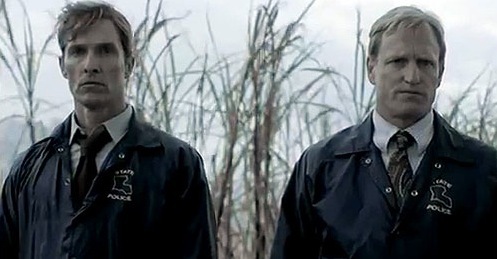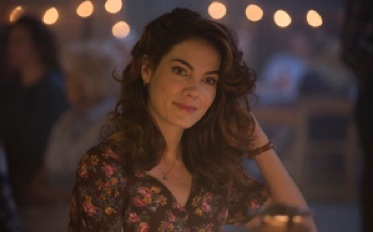I'm taking screenwriter Nic Pizzolatto at his word: that there's nothing coming at the end of his superbly crafted and brilliantly acted True Detective (concluding tonight on HBO) that relies on the supernatural or extraneous evidence not previously presented in the series. If he's a bullshitter -- and I don't think so; the series has been too real, too honest with its audience throughout -- then he's in for some serious fecal blowback in the flat karmic wheel of showbiz.
I'm also buying heavily into the early foreshadowing of Marty Hart's reference to "the detective's curse," namely that the "solution was right under my nose, but I was paying attention to the wrong clues."
So here's the requisite spoiler alert: If you believe, as many have speculated, that either Hart (Woody Harrelson) or his partner Ruston Cohle (Matthew McConaughey) are part of the conspiracy, then you probably won't want to go any further here. Ditto if you're looking at the owner of the Vietnamese restaurant at which Hart and Cohle have lunch one day. Keep your head where it's dark and pungent. My speculation and linkage of the evidence is even bleaker and a lot more disturbing. And I think I may be right.
First off, the easy one: It doesn't take a weatherman to know which way the wind's blowing in the moral wasteland of the Louisiana bayous.
In his most recent post-episode interview, Pizzolatto says a little cryptically that we've seen the face of our killer. It's the closing shot of Episode Seven -- "Lawnmower Man," Errol Childress (played by Glenn Fleshler), the "green-eared spaghetti monster," whose police sketch, provided by one of his victims, is featured in Cohle's makeshift investigation headquarters. Childress is the illegitimate grandson of Sam Tuttle, father of Reverend Billy Lee Tuttle, and uncle of Eddy Tuttle, the former governor of Louisiana and now a U.S. Senator. It's part of the conspiratorial "sprawl" that Cohle has referenced throughout the series.
We know with cold certainty that Reverend Tuttle was one of the conspirators; he's dead. So are Reggie and Dewall Ledoux. With Childress now identified, that makes four. Certainly other members of the extended Tuttle/Childress/Ledoux clan are involved in the conspiracy as well. That's where Pizzolatto wants us to go.
But here's the nitty, gang, and it's on all of us that we skipped over it. Recall when Hart's young daughter Audrey is revealed to have drawn several obscene images in a notebook and Hart sees that she has arranged a sexualized gang-rape formation out of some small plastic toy figures in her bedroom? That storyline never had any resolution. It got swept under the narrative arc. And there hasn't been a false move yet in Pizzolatto's superbly crafted screenplay.
Take a look at the freeze frame of those figures: they form precisely the same formation that's in the photograph of murder-victim Dora Lange with five horseman dressed in Courir de Mardi Gras costumes and in the horrific video footage found by Cohle in one of Billy Lee Tuttle's mansions of Marie Fontenot being raped. Hart screams in dire anguish when he watches the footage; the truth is -- it was right under his nose all along -- that he's seen the imagery before in his daughter's bedroom.
And remember that scene where Audrey takes the crown from her sister's head and throws it up into a tree? Marie Fontenot was wearing a similar crown. (It's also the cover footage for Hart's soliloquy about overlooking evidence.)
Ruston Cohle also knows the same formational imagery. He's seen the footage. While he's being interviewed by detectives Maynard Gilbough and Thomas Papania, he cuts out five makeshift figures from his six-pack of Lone Star beer, and places them in front of his interrogators. It's the same formation as in the Lange photograph and the footage of Marie Fontenot and in Audrey's bedroom. The sixth can he turns into a metaphor for flattened time.
So we've got at least as many as five perpetrators. Three are dead and one is standing in the cemetery. The Yellow King could be the progenitor of this madness, Sam Tuttle. Could be his nephew, the former governor (king?) of Louisiana, Eddie. Could even be Errol. But I think Maggie's father is also involved in this, too. And that's why it's on us: all the signs were there and we looked right past them. Maggie's got some dark stuff she's hiding. When Gilbough and Papania query her about Cohle and Hart's bad blood, she flat out lies. She's not above the cover-up, especially when illicit sexuality is involved. Pizzolatto went out of his way to establish that kink in her character. And how did she know where Cohle was working? And why did she really go to see him?
Maggie's got something to do with the denouement. She's hovered on the periphery throughout the series, moving to center stage only on occasion, but with an unsteady undercurrent and sufficient ice running through her veins, all suggesting that she's somehow involved in this madness.
So I'm predicting that it's all gonna hit a little closer to home than the Tuttles and Ledouxs. Maybe Maggie's father is the illegitimate offspring of Sam Tuttle as well. But nothing in this show does not circle back and that's the one storyline that has yet to come home.
As they say in the Spanish quarter, vamos a ver.
If I'm wrong, well, then, I'm wrong. Won't be the first time. Certainly won't be the last. And I'll get on with my life after the conclusion of Sunday's final episode and put some crow on the spit.
But if I'm right, then Nic Pizzolatto took a serious -- and brilliant -- artistic gamble in the narrative arc of his screenplay, a wager calculated on a deep dark propensity in the American psyche. And, if I'm right, like Ruston Cohle, I'll "close the loop" on that speculation when it's over.
Welcome to Carcosa.


